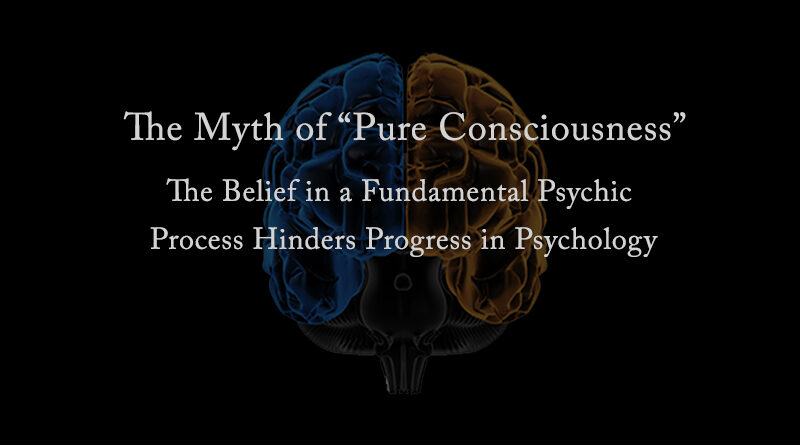The Myth of “Pure Consciousness”
The Belief in a Fundamental Psychic Process Hinders Progress in Psychology
“If understanding a thing is arriving at a familiarizing metaphor for it, then we can see that there always will be a difficulty in understanding consciousness. For it should be immediately apparent that there is not and cannot be anything in our immediate experience that is like immediate experience itself. There is therefore a sense in which we shall never be able to understand consciousness in the same way that we can understand things that we are conscious of” (Jaynes 1976, p. 53).
I have often wondered why so many well-credentialed researchers continue to bark up the wrong tree in their quest to understand consciousness. Many reasons could be offered, but in a recent discussion on the “Julian Jaynes — The Origin of Consciousness in the Breakdown of the Bicameral Mind” Facebook page someone brought up Jaynes’s aforementioned quote. The perspicacity of this citation has always haunted me. After some contemplation it occurred to me that one reason so many struggle to grasp Jaynes is because of their premise that consciousness is a sort of stand-alone psychic force or stuff that can animate our minds the way blood infuses our bodies. In other words, some of us believe in the existence of “pure consciousness” or experience unqualified by conception, association, or immediate apprehension. Whatever “pure consciousness” is, the assumption is that it can be cleanly detached from the psyche in the same way early scientists attempted to isolate the essence of life in a test tube (vitalism). Most researchers, I suspect, do not explicitly know their projects are distorted by this erroneous presumption. And that’s a big problem, because if we are not mindful of our background presuppositions we can never interrogate and test their validity. The belief in an innate, primary psychic process, untainted by empirical experience, hinders progress in psychology.
The Disguises of Consciousness
Can the “I” directly encounter some sheer essence of cognition (whatever that is)? Can one think without thinking? Can one perceive without perceiving? Can one experience without experiencing? Can information be stripped down to an informationless version so that the flow of data is somehow untouched and untreated by the immediacy of the real world? Is there consciousness without content? An experience of experience? I do not think there is since psychological processes by their very nature demand content of some sort, i.e., they require input from the environment.
In the same way there is no such thing as valueless numbers, waterless oceans, or lightless sunbeams, there is no such thing as contentless consciousness. We use the term consciousness as a convenient, ambiguous abstraction, an imprecise generality; its experience arises from a vague, intuitive sentiment. Few of us seriously consider its actual nature, and when we do, we have a tendency to entangle it in perception, thinking, and other psychological processes. This allows consciousness to disguise itself, thereby confusing us about its actual nature. But in the same way we can never discover pure numberness, we can never find unadulterated consciousness. Psyche cannot be distilled down into some quintessence. No fundamental nature of mentation is to be discovered, as if psychological processes possess a substance-like distillate. There is no extract of mind. And yet this appears to be the premise of many research projects investigating consciousness.
Consciousness as a Convenience
Any type of experience, no matter how unprocessed and unmodified, requires an experiencer. But if even the notion of uncontaminated and unsullied consciousness has validity, it implies that someone or something must be registering the experience. Though the “I” of Jaynesian consciousness might seem a candidate for an inner person-like entity that records experience, we need to remember that like other contents of consciousness, it is a product of the machinery of mentation and lacks complete objective detachment from the world.
As an analogy, consider the elements constituting perception: (1) a perceiver (experiencer); (2) perceiving (experiencing); and a (3) percept (the experienced). Is it possible to isolate these three aspects, as if uncontaminated sensation floats about, existing among the three elements? For analytical purposes, yes, but such a maneuver is methodological (for research purposes) and does not mean they can be ontologically disentangled from each other. This point applies to consciousness.
Or consider meditation. This exercise prioritizes our thoughts, provides perspective, and de-emotionalizes our stormy waters of the mind. It may seem as if an “I” were doing the meditation. In reality, however, it is our mind’s tireless stagehands working backstage, supporting a provisional “I.” This subject self is recreated second-by-second in our mental theater, creating the illusion that an executive, in-charge, directing egoic, “I” is the star of the show.
The Benefits of “Pure Consciousness”?
Of course, pure consciousness may exist (in the same way that God may exist), but as of now it is difficult to scientifically demonstrate this. It is not my prerogative to dismiss clients or individuals who claim to have encountered pure consciousness (sort of like the unconditioned “original mind” of Buddhism), anymore than it is my business to argue with them about the existence of God. If some experience or belief helps someone deal with the overwhelming terror is sometimes reality, that is a good thing. Along these lines, Jungian psychology has of late garnered much attention. Despite Jung’s intellectual influence, I do not accept his claims about the collective unconscious and archetypes. However, if these provide growth and guidance for an individual, so much the better.
Learn more about Julian Jaynes’s theory by joining the Julian Jaynes Society and reading our books.



Pingback: Julian Jaynes Society October 2022 Newsletter - Julian Jaynes Society
Pingback: In Case You Missed It... - Julian Jaynes Society